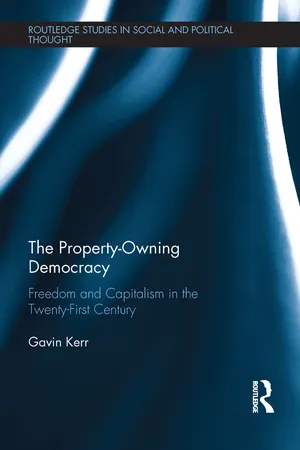The Property-Owning Democracy
About this book
The ideas of 'predistribution' and the property-owning democracy have recently emerged as the central features of the progressive social liberal response to the problems of poverty, unemployment, economic insecurity, burgeoning socio-economic inequality, and economic instability, none of which the more familiar institutions of welfare state capitalism seem able effectively to solve. These social liberal proposals for institutional reform have, however, been rejected by 'neo-classical' liberals who have attempted to modernize and revitalize the traditional classical liberal case for a set of 'market democratic' laissez-faire institutions. This book makes a fresh attempt to demarcate an area of common ground between the positions occupied by classical and social liberals by identifying a set of institutional arrangements to which both can agree, while at the same time recognizing that there will be many important issues about which liberal (and non-liberal) political and social thinkers will continue strongly to disagree.
Drawing on ideas and arguments identifiable within a particular branch of the left-libertarian tradition, the book develops market democratic interpretations of the ideas of predistribution and the property-owning democracy, and presents a powerful case for an institutional reform which constitutes a genuinely progressive alternative to more familiar social democratic institutions. By identifying progressive predistributive institutions as essential conditions both for the effective protection of 'market freedom' and for the maximization of the substantive opportunities of the least advantaged members of society, the book shows how these institutions may be justified on grounds which both classical and social liberals may reasonably be expected to endorse.
Tools to learn more effectively

Saving Books

Keyword Search

Annotating Text

Listen to it instead
Information
Table of contents
- Cover
- Half Title
- Title Page
- Copyright Page
- Table of Contents
- Acknowledgements
- Introduction: Three Traditions of Liberal Political Thought
- 1 Classical Liberalism and the Idea of Market Freedom
- 2 Social Liberalism and the Rejection of Market Freedom
- 3 Geo-Libertarianism: The Prioritization of Unorthodox Market Freedom
- 4 Justice as Fairness and the Priority of Substantive Opportunity
- 5 Liberal Socialism and the Right to Private Property
- 6 The Market Democratic Property-Owning Democracy
- Conclusion: The Socialization of Rent: An Idea Whose Time Has (Almost) Come?
- Index
Frequently asked questions
- Essential is ideal for learners and professionals who enjoy exploring a wide range of subjects. Access the Essential Library with 800,000+ trusted titles and best-sellers across business, personal growth, and the humanities. Includes unlimited reading time and Standard Read Aloud voice.
- Complete: Perfect for advanced learners and researchers needing full, unrestricted access. Unlock 1.4M+ books across hundreds of subjects, including academic and specialized titles. The Complete Plan also includes advanced features like Premium Read Aloud and Research Assistant.
Please note we cannot support devices running on iOS 13 and Android 7 or earlier. Learn more about using the app
